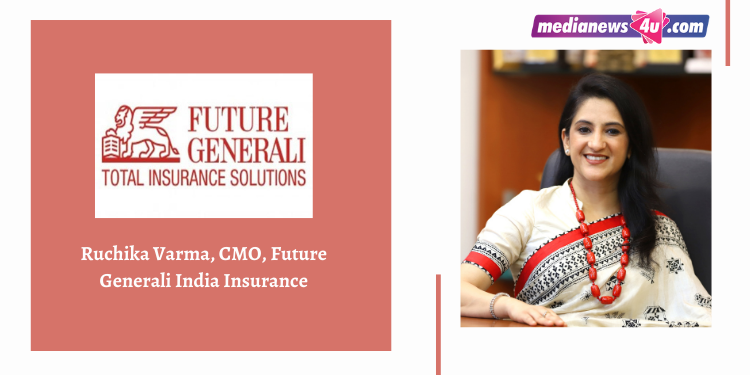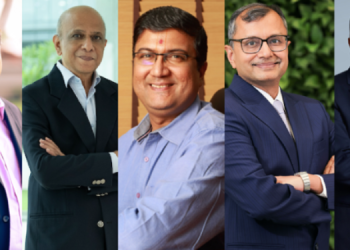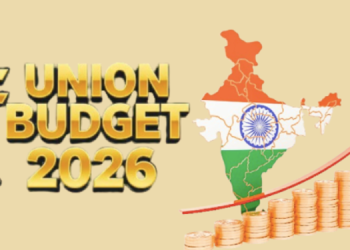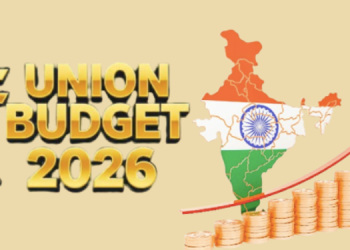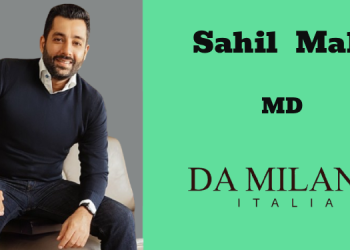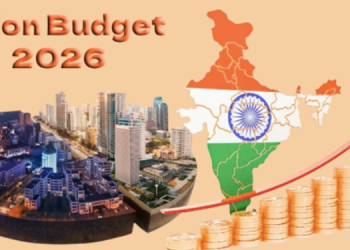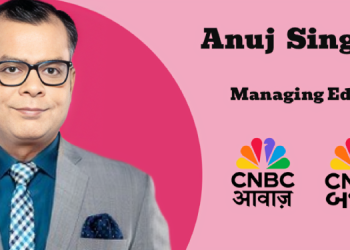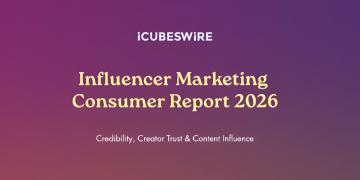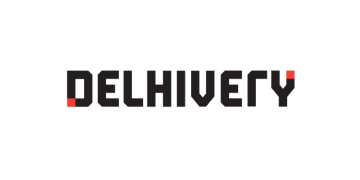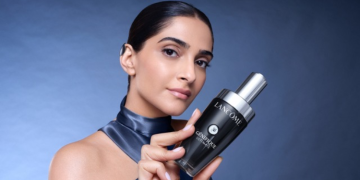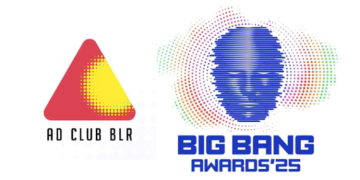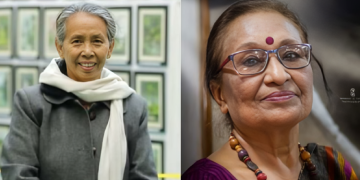Five years ago, WHO estimated that over 90 million Indians suffer from some form of mental illness and COVID-19 has only made this worse. Concerns about physical health, extended lockdowns leading to long periods of social disconnection, fear of losing jobs and increased stress due to new learning methods, working and studying have all taken a toll on us and escalated the problem.
Future Generali purpose as an Insurance company is to be a lifetime partner for the customers and lead with empathy, human touch and innovation; decided that a concerted effort would get Indians to take their mental health seriously.
As the first step of its multi-phased campaign – #HealthInsideOut, Future Generali India Insurance rolled out the – Total Health Score, a unique self-assessment tool that enables an individual to quantify one’s mental health status.
Based on the insight that first manifestation of mental health issues is inflicted on inanimate objects, FGII released a video series that humanises such objects and tells a compelling story from their perspective, urging the audience to seek timely help and realise these issues’ gravity. The videos are created using Stop motion technique where the emotions of each objects are manually brought into life
In an exclusive chat Ruchika Varma, CMO, Future Generali India Insurance talks to us about the campaign and what triggered them to do this campaign.
It has been a very eventful 2020 for Future Generali with many campaigns highlighting physical and mental health, your thoughts?
As a brand, we have always been known for motor insurance. However, given the positive inclination of consumers towards health insurance due to COVID-19, our marketing objective was to create a connect with the health category and become a significant player within this category. We, therefore, launched multiple campaigns around health insurance during the year.
We started the year with #CoverTheDistance, a multiphase health insurance campaign that urged Indians to look at the silver lining and use the lockdown to re-energise their relationships with their loved ones. This campaign was the brand’s response to COVID-19 and our objective was to lead with empathy and tell our customers that we are with them even during this crisis.
We started analysing data that told us that COVID-19 is taking a toll on people’s mental health during the year. With unemployment being at an all-time high, salary cuts and the struggles of adapting to a new normal, it wouldn’t be wrong to say that India is currently facing a mental health crisis in light of the COVID-19 pandemic. According to the World Health Organization (WHO), one in every five Indians suffers from some form of mental illness.
And yet, mental illness continues to be a taboo subject in the country. As a brand that leads to innovation and human touch, we believe that this is the right time to start a movement to propel Indians to take their mental health seriously. With the #HealthInsideOut campaign, Future Generali hopes to spark the conversation, make it mainstream, and create some much-needed awareness about the issue.
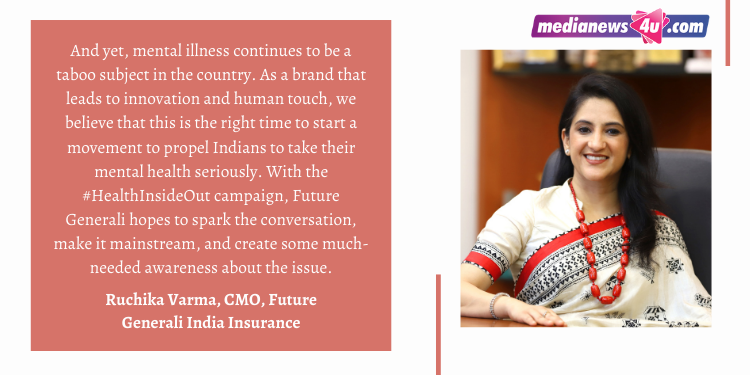
Why an animated campaign?
With our recent #HealthInsideOut campaign, we aimed to bring the discussion around mental health into people’s living rooms. Our objective for launching this campaign is four-fold—de-stigmatize the issue by showing that it’s a common problem; create the realization that some of these seemingly common-place symptoms could be signs of mental illness; urge action by telling our audience to not ignore these underlying signs, and educate people that help is available, whether it is medical or financial.
Our research with mental health experts and affected parties told us that the first manifestation of mental health issues is inflicted on inanimate objects. Early symptoms of underlying mental health issues such as stress, anxiety, insomnia or anger can be manifested in behaviours such as the excessive squeezing of a stress ball, the constant biting of nails or a T-shirt, chewing the end of a pencil or a pen cap, the constant shifting of the pillow, the throwing of things in rage, etc. Using this insight, we decided to deliver our message by humanising such objects and telling a compelling story from their perspective, urging the audience to seek timely help and realise the gravity of these issues.
A topic such as mental health needs a sensitive approach. And so, instead of taking a serious tone, we sought to take a relatable, light, humorous, and engaging narrative to hook the audience’s attention, leading them to a penny drop moment when the key message is delivered.

You have specifically highlighted that mental health is of prime importance, how have you used various surveys and insights to stress on this and make it part of the conversation?
India has a large, unaddressed mental health problem. Five years ago, WHO estimated that 7.5 % of Indians suffer from some form of mental illness. By 2020 this figure is now estimated to be a whopping 20%. The COVID-19 pandemic has only made it worse, and the research we had done earlier told us that a whopping 88% of Indians were deeply worried about their physical, financial or mental health. We realised then that this was a much bigger problem than had been initially anticipated. Despite the staggering statistics, the discussion around mental illness in the country is almost non-existent. Most people shy away from discussing it; those suffering from mental health issues typically live in denial, ignoring even the obvious symptoms of mental illness. And sadly, those who do realize that something is amiss usually do not get support from friends or family.
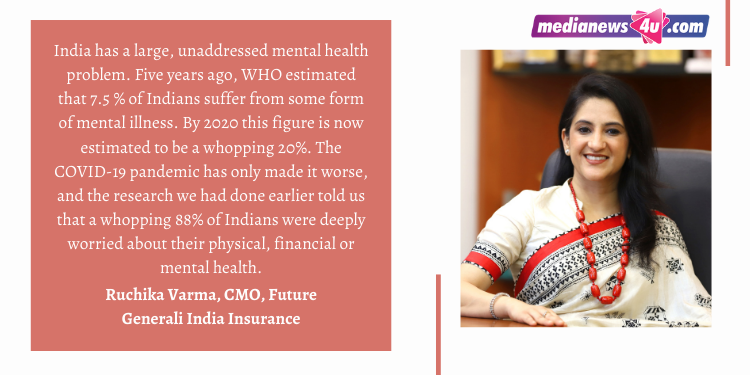
As a brand that offers health insurance, we wanted to address some of these issues, fill market gaps and become even more relevant to our customers. We believed that this was the right time to propel a movement to get Indians to take their mental health seriously. We had multiple conversations with mental health experts that helped us gain valuable learnings and enabled us to develop the right propositions and messaging for our customers. We also did focus groups with those undergoing mental illness treatments to help understand their journey, giving us incredible insights on the role that the category and brand can play to make this journey smoother. These conversations became the starting point for the campaign conceptualization.
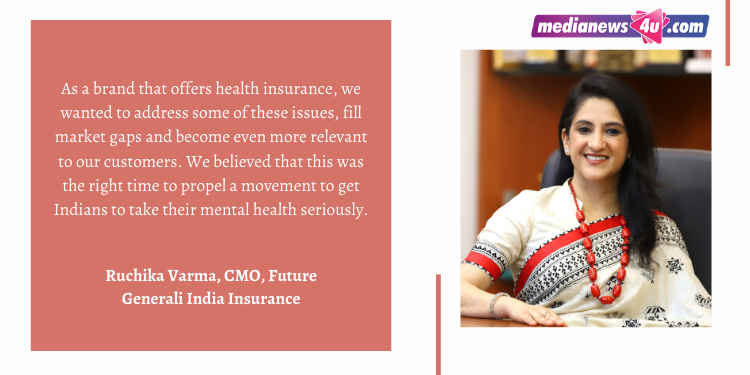
The pandemic and lockdown saw a huge surge in Digital consumption, is the marketing/media plan skewed towards Digital?
Our media strategy always follows consumer behaviour and this campaign is no different. Social distancing has led to online social connectivity and visits to social media sites have increased by 19% last year over an already high base. Therefore Instagram, Facebook and YouTube are key mediums for us. We see shifts towards digital in media consumption patterns. There is a switch to OTT platforms, which have seen an increase in viewership by 3-4 million. News is now increasingly consumed digitally, evident in the spike in visits to news sites by more than 40% and the increasing popularity of apps such as In-Shorts. We’ve also picked up a surge in health insurance search by 23%, making Google even more central to our media planning. We will be present on all these digital platforms in a big way to promote our message.
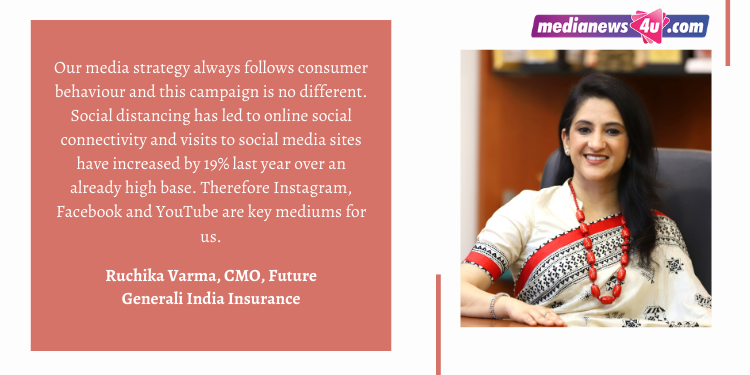
How have you gone about marketing this initiative, your media plan?
We are where our audience is, which is on digital platforms. Our media plan is an optimal mix of social media, search, GDN, affiliates and OTT platforms.
What have been the responses from your existing customers and how many new customers have you added based on these campaigns?
We have received a positive response from our customers and distributors on all these campaigns. Due to these campaigns, our website visitors have increased 2.5 times, our app downloads have doubled, our social media followers have increased manifold, our brand funnel has consistently improved quarter on quarter and our NPS scores have been the highest than they have ever been.
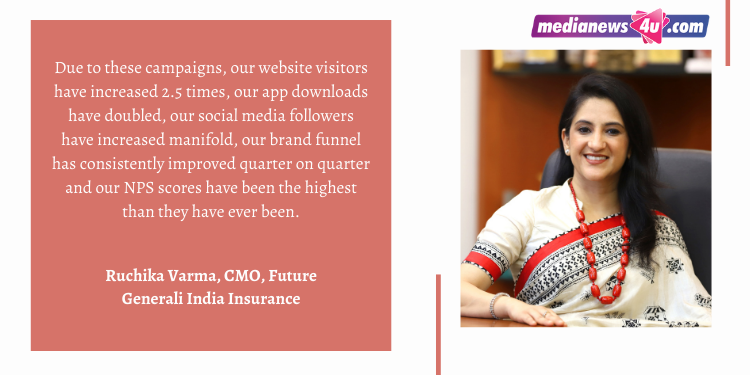
What will be your other activities both at ATL & BTL to take this campaign forward?
Future Generali wants to lead the narrative on mental health. The starting point of this narrative was to get people to understand that mental health is as important as physical health and we gave them quantifiable ways to measure it. To enable this, we created the Total Health Score, a simple questionnaire & API-based assessment available on our website and mobile app.
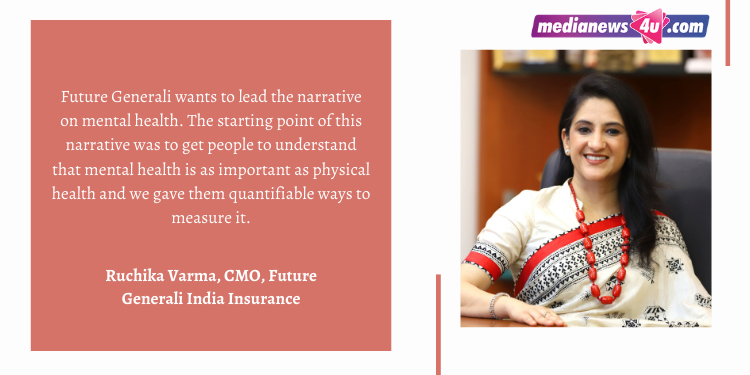
To help understand these issues and to manage them, we also developed a library of assets around key issues that Indians are suffering from today – stress, anxiety, insomnia, depression and anger.
Our stance on mental wellness is not just for our customers, it’s a brand philosophy that is extended to our employees. Early on in the lockdown, we launched a free COVID Helpline where our employees could speak to a counsellor and seek help from mental health experts. We have also run wellness sessions like Yoga and Zumba, to keep them de-stressed, and organized fun game sessions post work where families could also participate. As lines between personal life and work are constantly getting blurred in the WFH scenario, the organization has also been sending work-from-home tips to ensure that employees take some time off to unwind.
Moving ahead, we plan to roll out multiple initiatives around mental health and well-being – be it differentiated and innovative product propositions, services or partnerships to support customers.
Future Generali has made mental health and wellness a key pivot in its brand story. We plan to continue building conversations and driving awareness around mental health to position Future Generali as a relevant, differentiated brand focused on consumers’ needs.


